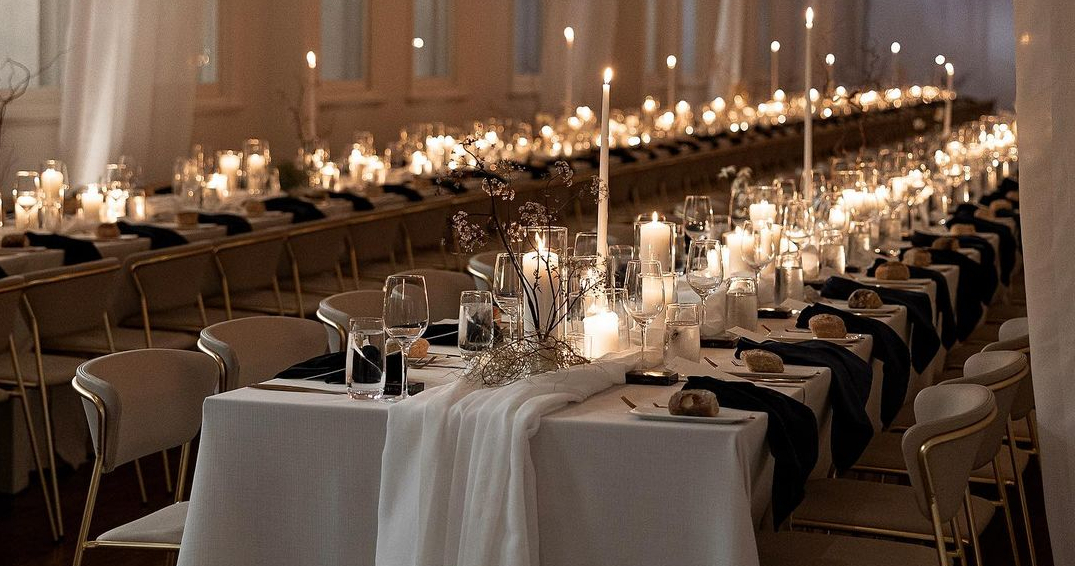@cinziabruschini , @mervetogan
Wedding reception organization is one of the most essential parts of the whole planning process. The right timetable for your wedding day will ensure a harmonious flow of events, satisfy your guests and help create an unforgettable atmosphere on your special day. Through careful preparation and appropriate time management, it is possible to create the perfect wedding reception schedule that will reflect your personality and style and make the day truly special. Keep reading to learn more details and crucial tips on how to create the ideal bridal reception timeline.
Venue Conditions and Time Frame
The venue sets the stage for the entire celebration, influencing factors such as layout, capacity, ambiance, and logistical considerations. Understanding and working within the constraints and opportunities presented by the venue can greatly impact the flow and overall experience of the reception. Terms, such as the size and layout of the space, and any restrictions on decor or noise, directly affect how the event can be structured. Taking these factors into account when planning the timeline can help prevent issues such as overcrowding, delays in service, or logistical challenges that could disrupt the reception. Additionally, the time management for the reception is a critical component of the planning process. Setting a realistic and well-thought-out schedule that accounts for the duration of each aspect of the event, from cocktail hour to dinner service to dancing, is essential for keeping the celebration on track and ensuring that everything runs smoothly. Understanding how long each activity will take and allowing enough time for transitions between them can help prevent rushed or delayed activities and allow guests to fully enjoy each part of the reception.
@thelightandcolor , @francescamirandabridal
Define Wedding Activities
Defining the wedding program is a key step in planning a wedding reception timeline, as it sets the structure of the event. Begin by listing all the key elements of the reception, such as the grand entrance, toasts, dinner service, cake cutting, first dance, bouquet toss, and any other special traditions or activities that you wish to include. This will serve as a starting point for structuring the timeline. Estimate the amount of time needed for each activity based on factors such as the number of guests, the complexity of the activity, and any special considerations. Be realistic in your timing estimates to avoid running behind schedule. Once you have outlined all the key elements and their estimated durations, create a cohesive sequence for the activities that makes logical sense and ensures a smooth transition between them. Share the finalized timeline with your wedding planner, vendors, and key members of your wedding team to ensure that everyone is on the same page and aware of their roles and responsibilities. While it's important to have a well-defined timeline, be prepared to adapt and adjust as needed on the day of the event.
Consider Setting Time Limits for Speeches
While speeches and toasts are an integral part of the celebration, they have the potential to become lengthy, or off-topic if not properly managed. Weddings often involve multiple speakers, including family members, friends, and members of the wedding party. Limiting the duration of speeches allows for equal time for all speakers and ensures that each person has the opportunity to share their wishes and sentiments. A well-planned wedding reception timeline is essential for coordinating all aspects of the event, from the dinner service to dancing to formalities such as speeches. By establishing time limits for speeches, couples can better manage the overall schedule, ensuring that each segment of the reception proceeds smoothly and according to plan.
@sydneymarie.co , @alexjack.photography
Listen to Yourself
Your wedding is a reflection of your love story, personalities, and shared values. By listening to yourself throughout the planning process, you can incorporate meaningful details, traditions, and experiences that resonate with you as a couple. This personal touch can elevate the reception timeline and create a more authentic and memorable celebration. During the preparation period, there will be many people, not counting the group of professional planners, who will want to share their insights or help you with advice. While assistance can be beneficial, sometimes the influence of other people's opinions can misdirect the event. Remember, this is a big day for you and your partner, so it should go along with your expectations only.
@vincenzodascaniostudio , @emotionsandmathweddings
Don’t Be Afraid to Break the Rules
Going back to what we said above, there are no rules about how a wedding should go. Each couple sets their own schedule and order of activities. For example, if you want the first dance to open the reception, why not? Alternatively, you can always think about coming up with your own wedding activities that will suit the vibe of your wedding and entertain your family and friends. Remember that what matters most is the comfort of you and your guests. When planning your wedding schedule, try to make this factor your priority. For example, don't take too long with a cocktail hour or dinner so that no one has to experience negative feelings because of hunger. But segments of the event that are driven by your vision can and should be flexible to suit you.
































